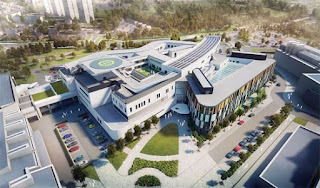The £150M Royal Hospital for Sick
Children and Department of Clinical Neurosciences is considered as the single
largest project that was designed by HLM Architects. To carry out this complex
project, the project team had implemented UK Building Information Modelling
(BIM) Level 2 from the beginning of the project.
The project team had embraced a
“full BIM Level 2” working surroundings and gradually formed a ‘Project
Information Model’ or PIM all through the design and construction phases.
That PIM comprises of structured
graphical and non-graphical information which are preserved in a Common Data
Environment (or CDE); a common online space that is available to all concerned
parties.
HLM
Architects substantiated their graphical information models in ARCHICAD. The
information model of the project was formed recurrently over time. HLM’s Model
Manager received a graphical information model files from across the design
team and supply chain on a twice-a-week basis, afterward integrate or
‘organize’ them into a single model for evaluating in design co-ordination
meetings.
All
the project related drawings are generated in the 3D model, in ARCHICAD. The
mass [of the data] is then exported as PDFs or Excel spreadsheets and uploaded
to the CDE.”
By utilizing PDF or Microsoft
Excel format, the information was made available to all sections of the supply
chain.
In
the project, there were advanced mechanical and electrical installations and
huge amounts of equipment. Besides, a very data heavy project information model
is also required for the project. To resolve this problem, the team seldom
loaded-up the complete federated model rather than they divided it into
controllable sections, only looking at the specific information they needed to
at any one time.
By producing the comprehensive
design in a BIM surrounding, a robust information model is formed for being
analyzed on site.
~~~~~~~~~~~~~~~~~~~~~~~~
Published By
Rajib Dey
www.bimoutsourcing.com
~~~~~~~~~~~~~~~~~~~~~~~~

No comments:
Post a Comment